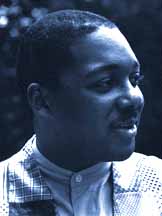At The Octoroon Balls
by Bruce Adolphe ©1995
Listen to Hellbound Highball by Wynton Marsalis.
These notes were written for the premiere of At the Octoroon Balls, commissioned by the Chamber Music Society of Lincoln Center and Jazz at Lincoln Center.
 WE SEEM TO LIVE IN AN ERA OF CULTURAL CROSSOVERS, of exploring diversity. This is a time when klezmer Giora Feldman's wailing clarinet is joined by the Cleveland String Quartet, Edgar Meyer's Nashville, home-spun country style tunes are strummed and bowed by the Emerson String Quartet, a member of the composition faculty at Princeton is an electric guitar virtuoso (Steve Mackey) and Itzhak Perlman cuts a jazz album with Oscar Peterson. It's a good time for master jazzer Wynton Marsalis, the artistic director of Lincoln Center's Jazz Department, to write a string quartet.
WE SEEM TO LIVE IN AN ERA OF CULTURAL CROSSOVERS, of exploring diversity. This is a time when klezmer Giora Feldman's wailing clarinet is joined by the Cleveland String Quartet, Edgar Meyer's Nashville, home-spun country style tunes are strummed and bowed by the Emerson String Quartet, a member of the composition faculty at Princeton is an electric guitar virtuoso (Steve Mackey) and Itzhak Perlman cuts a jazz album with Oscar Peterson. It's a good time for master jazzer Wynton Marsalis, the artistic director of Lincoln Center's Jazz Department, to write a string quartet.
We might wonder along with George and Ira Gershwin, "How long has this been going on?" The answer is a very long time. As surely as Papa Haydn appropriated Croatian and Hungarian folk dances and Beethoven made arrangements of popular songs like "Sally in our Alley," musicians have never been as compartmentalized in their creative endeavors as is commonly supposed.
While it is a more recent phenomenon that a jazz composer will tackle a string quartet, "classical" composers have been interested in jazz since it burst upon the scene. In the early part of our century, there was an explosion of jazz-influenced composing in Europe. "You Americans take jazz too lightly," wrote Maurice Ravel in 1928. "In my opinion, it is bound to lead to the national music of the United States."
For Wynton Marsalis, the invitation to compose a work for The Chamber Music Society of Lincoln Center became a more significant "cross-over" endeavor once the medium of string quartet was agreed upon. The string quartet remains the quintessential classical medium. Almost everything there is to know about the mysteries of musical thought can be learned from the string quartets of Beethoven alone. Composers since Beethoven have turned to the string quartet for their most intimate and profound musings.
Wynton Marsalis comes to the string quartet as a renowned jazz player and composer, but a stranger to the string quartet medium. Being a mature artist, Marsalis approached the task in the right way: as himself, drawing on his own life and music for material. A composer may turn to the outside world to borrow, as Ravel borrowed the "blues," and a composer may cross boundaries, as Marsalis does here; but it is inward that all creative artists must look for inspiration, for the memories that fire the imagination.
Wynton Marsalis's At the Octoroon Balls is inspired by the composer's early life in New Orleans. "A ball is a ritual and a dance," Marsalis explains. "Everybody was in their finest clothing. At the Octoroon Balls there was an interesting cross-section of life. People from different stratums of society came together in pursuit of pleasure and fulfillment. The music brought people together."
New Orleans is considered the birthplace of jazz. From West African cross-rhythms, the work songs of slaves, field hollers and spirituals, came ragtime and the blues. This mixed with European-American quadrilles, waltzes, sentimental ballads, brass bands, cigar-box guitars, clarinets, comets and trombonesóand that's how jazz was born.
Wynton, too, was born in New Orleans (Crescent City). The musical education of this modern American included traditional jazz in a Baptist church, R&B, the Crispy Critters (top 40 band), Juilliard, salsa bands, Broadway pits and the Brooklyn Philharmonia; culminating in a relationship with Art Blakey as a regular with the Jazz Messengers. Wynton speaks lovingly of Art Blakey. "He taught me the real meaning of jazz music, that it has a spiritual connection and that it is about American democracy."
As it turns out, jazz and the string quartet are natural stagefellows, as the music on this program demonstrates. There is something that jazz and classical chamber music share which is not shared by commercial, popular music. What is that something? I believe it is perfectly expressed by Wynton Marsalis when, speaking about influences on his life and work, he said, "My father, Ellis Marsalis, helped me understand the joy of seriousness."








